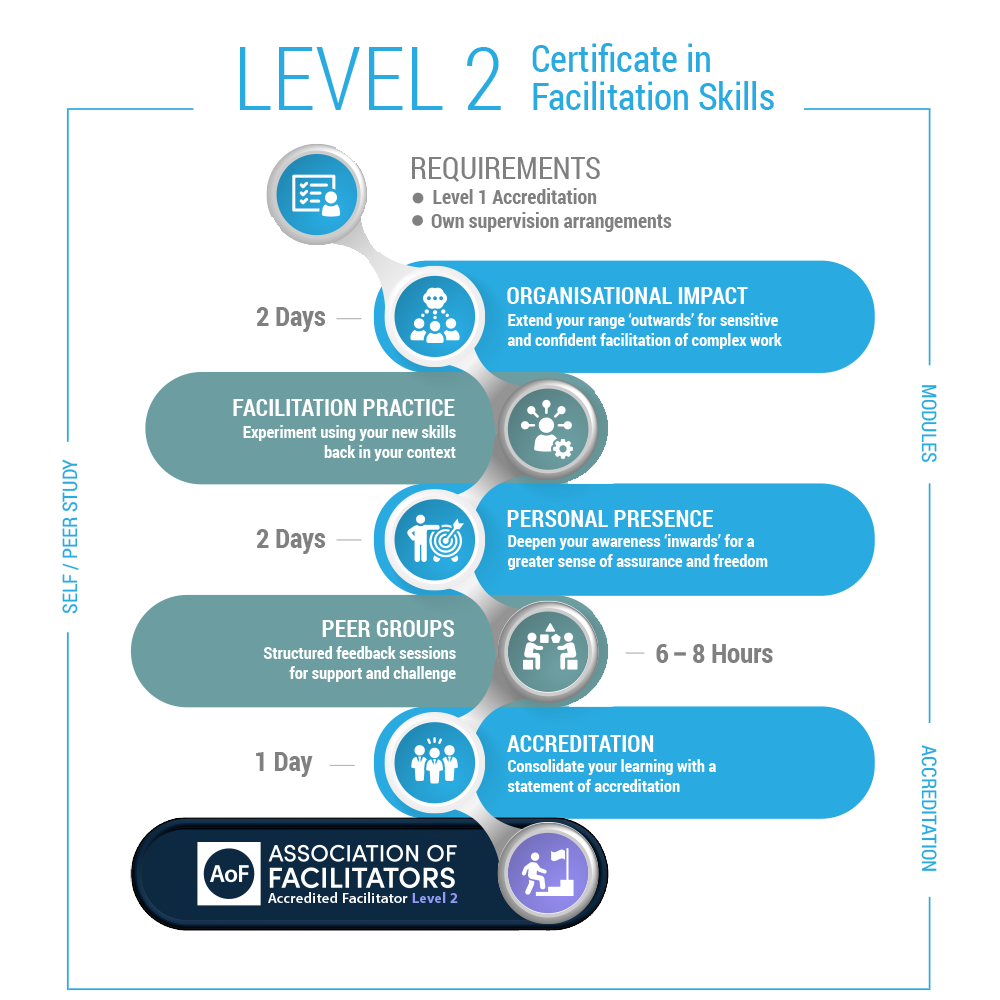CERTIFICATE IN FACILITATION SKILLS
Deepen and Extend your Learning… Level 2 Accreditation
The Certificate in Facilitation Skills deepens and extends learning from the Foundations Programme (or equivalent route to Level 1 accreditation). Learning is extended ‘outwards’ — offering a range of theoretical and practical approaches to underpin effective Organisational Development (OD) — and ‘inwards’, to a deeper grounding of personal awareness, assurance and skill as a facilitator. You will be encouraged to stretch your facilitation style in a way that is authentic for you and interrelates your personal, professional and social domains.
About the Certificate Programme
The Certificate in Facilitation Skills Programme comprises two modules and an accreditation day – 5 contact days in total. Attendance on both modules, peer group meetings, supervision, and self-study are required for accreditation at Level 2.
Level 1 Accreditation is a pre-requisite for the Certificate in Facilitation Skills Level 2.
Methods
At AoF we are committed to experiential learning and reflective practice. You will be working in small groups of up to 12 participants, with smaller subgroups for skills practice and peer review. Activities will include theory input, practical activities, group discussion, practice sessions, feedback, and self & peer assessment – a blend that supports real-world application of organisational development theory and models.
Deepen and Extend your Learning… Level 2 Accreditation
The Certificate in Facilitation Skills deepens and extends learning from the Foundations Programme (or equivalent route to Level 1 accreditation). Learning is extended ‘outwards’ — offering a range of theoretical and practical approaches to underpin effective Organisational Development (OD) — and ‘inwards’, to a deeper grounding of personal awareness, assurance and skill as a facilitator. You will be encouraged to stretch your facilitation style in a way that is authentic for you and interrelates your personal, professional and social domains.
About the Certificate Programme
The Certificate in Facilitation Skills Programme comprises two modules and an accreditation day – 5 contact days in total. Attendance on both modules, peer group meetings, supervision, and self-study are required for accreditation at Level 2.
Level 1 Accreditation is a pre-requisite for the Certificate in Facilitation Skills Level 2.
Methods
At AoF we are committed to experiential learning and reflective practice. You will be working in small groups of up to 12 participants, with smaller subgroups for skills practice and peer review. Activities will include theory input, practical activities, group discussion, practice sessions, feedback, and self & peer assessment – a blend that supports real-world application of organisational development theory and models.
Module 1: Organisational Impact (2 days)
Organisational Impact is a short course that extends your existing facilitator style and skills ‘outwards’ — offering a range of theoretical and practical approaches to underpin effective Organisational Development strategies. From your existing facilitation skillset, we consider how you can practically apply new approaches, models, and tools, within ever-present contexts and constraints, to create the conditions for high levels of performance and engagement within organisations.


Module 2: Personal Presence (2 days)
Personal Presence is a short course that extends your awareness ‘inwards’ — offering a range of opportunities to examine personal patterns and discard emotional ‘baggage’. We consider how you can practically hone your facilitation skills and consciously direct your energy and attention to use your ‘self as instrument’. The skills for working relationally, with awareness and presence, in the modes of both ‘being’ and ‘doing’ are developed through live dialogue, group experience and structured reflection. You become more aware of the lenses through which you interact with groups and organisations and how your personal ‘story’ influences how you ‘read’ others.
Self and Peer Assessment and Accreditation (1 day)
Having written a detailed self-assessment against the FACETS® competencies, obtained peer feedback, and gathered supporting evidence, this day will consolidate your learning into a clear statement of accreditation. You will be familiar with FACETS® from your prior accreditation at level 1. You will be expected to have read core texts from our reading list and to have received one-to-one supervision (minimum 3 hours, self-funded).

Who is this for?
The Certificate in Facilitation Skills course is appropriate for Level 1 Accredited facilitators. This course is appropriate for facilitators whose role substantially involves organisational development, leading groups and teams, and who are committed to both individual and team development. Typically, the course is attended by:
- Working within an organisation as a change agent, group/team leader, manager, director or project manager.
- In key roles with developmental, strategic or operational purpose (be that internal or external).
- Have a remit to bring about change in groups, teams and organisations
- Have experience of personal and organisational development theory and practice
- Be considering freelance work and/or an area of specialism to supplement to core facilitation skills
Participants are usually engaged in change work (or about to be) and may:
- wish to learn about themselves in a group from high-quality input and feedback
- need to better understand how to work with issues of inclusion, power and psychological safety
- have become aware of the absence of theories and models related to organisational impact and personal presence in their toolkit
Course Information – How to Apply
The cost of the full five days is £3588. If you wish to attend both modules but not to undertake accreditation, the cost is £2870 for four days. It is not possible to book single modules. The prices includes VAT, lunch and all course materials but does not include an overnight stay (approximately £140 ppn).
If you are interested in attending please also read the information for participants and complete the application form.
This course will take place at Henley Business School, Greenlands Campus, Greenlands, Henley-on-Thames RG9 3AU

